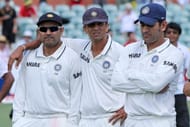LONDON, ENGLAND – NOVEMBER 12: Roger Federer of Switzerland returns a shot during his men’s singles final match against Novak Djokovic of Serbia during day eight of the ATP World Tour Finals at O2 Arena on November 12, 2012 in London, England.
During a team dinner with my colleagues at a really nice sea food restaurant we hit upon this discussion on sports. We moved from cricket to Chelsea to tennis. Someone at this juncture mentioned Roger Federer and exactly at the moment the name was mentioned me and my colleague sitting opposite to me said one word simultaneously:
‘Class’.
The next sentence both of us said was almost the same: Federer’s game is a treat to watch and if someone wants to learn to play the game gracefully, watch Federer. Rarely have I had discussions where there is so much similarity in views expressed. Even when the god of Indian cricket Sachin Tendulkar’s name arises, there are mixed views.
But what got me thinking out of this conversation was what exactly we mean by ‘class’. To understand this, like a typical MBA student I did a primary research. I asked few of my friends what came to their mind when the word ‘class’ was said. One of them said Sachin Tendulkar’s straight drive was a ‘class’ shot. Another said Rahul Dravid’s batting was ‘class’, something which I agree with whole heartedly. This Arsenal crazy friend of mine said class’ is something he wouldn’t use to define a player or shot or pass, but is something which can be seen often with certain players. If it is an involuntary exclamation of the word ‘class’ I was looking for, there are too many instances.
On egging him for an instance of the same, he said Zidane’s goal against Bayer Leverkusen was a ‘class’ finish. Another friend (a girl) got this angle of the seats at a stadium being ‘classy’ and the IPL being ‘class’ because of film stars. And just to give a taste of the people I encountered, as I put forth the question about what came to one’s mind when I said the word ‘class’, this geeky friend started off with his C++ gyaan on data structures and what not. And there was a group of people who said ‘class’ was a term which came out involuntarily when something out of the normal happens. In retrospect, it can be attributed to the player’s brilliance or practice. This is some sort of a Black Swan explanation to ‘class’. (Refer to the ‘Black Swan’ By Nassim Nicholas Taleb)

GLASGOW – May 15: Zinedine Zidane of Real Madrid celebrates winning the cup after the UEFA Champions League Final between Real Madrid and Bayer Leverkusen played at Hampden Park, in Glasgow, Scotland on May 15, 2002. Real Madrid won the match and cup 2-1.
The second part of my study was to go to the older generation and observe what they thought ‘class’ was. My cousin, who is a doctor specialising in anaesthesiology, almost put me to sleep with his long answer. According to him, ‘class’ cannot be defined without a scope. ‘Class’ is a word attributable to many players, matches and occasions. He extended his usage of ‘class’ to ‘classic’, which I thought was a different word altogether Another cousin ended up telling me, ‘Class is permanent, form is temporary’. He was a marketing graduate from a reputed institute, so it made sense. And finally my dad, who said that anyone who could score a basket and the only sound you heard was that of the ball coming down kissing the net making that familiar swoosh is a ‘class’ player.
The third step was adding my own understanding of ‘class’. I always thought ‘class’ was in doing the same things every other player did in a different way, which made it special and more effective. At least that is the way it appeared to me. Federer’s game is a refined and perfected version of tennis. His backhand strokes are a treat to watch. And another angle I would like to bring here is the way the player handles himself. Rahul Dravid and Roger Federer are two examples which come right up in my list of ‘class’.
Both of them are immensely talented, but for me, equally important is their calm demeanour and equanimity of their body language. Kevin Pietersen is someone whom I appreciate a lot as a batsman, but I won’t call him ‘class’ because of this second aspect.

ADELAIDE, AUSTRALIA – JANUARY 28: Virender Sehwag, Rahul Dravid and MS Dhoni wait for the presentations after day five of the Fourth Test Match between Australia and India at Adelaide Oval on January 28, 2012 in Adelaide, Australia.
Some other key points from this research:
- Very few said Sachin Tendulkar when asked for the personification of ‘class’, more people said Rahul Dravid.
- Lionel Messi and Cristiano Ronaldo were named quite often.
- One person said Felipe Melo’s pass to Robinho in the World cup quarter final against Holland was a ‘class’ assist.
- Michael Schumacher was named by one person.
Did I finally get an answer to my question? I guess not. ‘Class’ is a very subjective word with a lot of interpretations possible. The basic trend observed is to name the finest exponents of a game as ‘class’. Now this is the easiest definition of ‘class’. The people who delve more into a particular game and bring in particular shots or matches as instances of ‘class’. They have more examples to quote as well, but the best explanation to the word ‘class’ was given by someone I met on one of the forums:–
“Class” is just a word which describes our feeling towards a certain player or match or instance because it is unmatched, uncommon or appeals to our visual senses. It is common to use the term in public discussions to show one’s understanding of the game and gives the feeling of one being knowledgeable to others. Actually it makes no sense as long as one enjoys whatever sport he is watching and understands the game.
